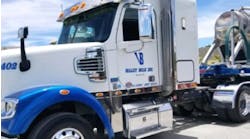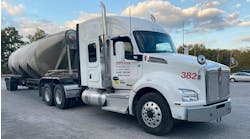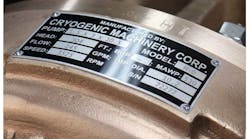BeyondTrucks expands integration hub
PSG acquires cryogenic pump manufacturer
With a single fleet acquisition, Trimac Transportation became one of the largest oilfield haulers in Western Canada. Trimac’s leadership called it a “once in a lifetime opportunity.”
The acquisition of Gibson Energy Inc’s oilfield tank truck fleet in mid-2019 brought Trimac more than 500 tractors operated by independent contractors and roughly 1,000 trailers, including crude oil B-trains, propane B-trains, molten sulfur B-trains, and petroleum coke B-trains. Approximately 160 Gibson employees transferred to the Trimac operation, which is now named Trimac Energy Services.
Trimac paid $70 million Canadian for the fleet assets, as well as another $30 million for real estate, including the Edmonton, Alberta, field office and maintenance shop. Trimac is continuing to provide transportation services to Gibson Energy through a long-term exclusive agreement.
“We are pleased that Gibson chose to partner with Trimac to provide transportation services and to support their growth,” says Matt Faure, president and chief executive officer of Trimac Transportation. “The addition of Gibson’s Canadian trucking business to our large portfolio of North American transportation businesses is a perfect example of how we continue to diversify and expand our business into new markets as part of our strategic plan.
“With this purchase, we doubled our size in Western Canada and gained critical mass. It has given us greater diversity in customers and commodities. While Trimac was already serving the downstream energy sector, we had no oilfield service operations in Canada prior to the Gibson deal. We’re now much bigger in Canada’s oilfield sector than we are in US oilfield operations.
“We had been hauling some natural gas liquids, but crude oil hauling now accounts for half of the new business. We also gained loads of condensate, LP-gas, molten sulfur, produced water and brine, and bitumen.”
Service Centers
Trimac has designated the Edmonton location as one of its three service centers in North America. The others are in Toronto, Ontario, Canada, and Houston, Texas. The Houston Service Center directs all of Trimac’s US tank truck operations, including oilfield hauling.
The Edmonton Service Center focuses on Western Canada, while the Toronto Service Center concentrates on the eastern half of the nation. Trimac Energy Services facilities in Alberta under the Edmonton Service Center umbrella are in Edson, Fort McMurray, Grand Prairie, and Hardisty. Oilfield operations extend into British Columbia and Saskatchewan, as well.
Three hundred of the 500 Trimac Energy Services trucks are based in Edmonton, as are 200 trucks from the general Trimac Transportation fleet. “The Trimac fleet is very busy in the summer hauling cement, fly ash, petroleum, and chemicals,” says Robyn Sadleir, vice-president of Operations North West. “Prior to the Gibson fleet acquisition, we were busiest in the summer months. Now we have a better balance of loads throughout the year.”
He adds that the Edmonton Service Center has begun moving drivers between both sides of the Western Canada operations to help them make maximum use of their available hours of service. “We’re still in the integration process, but we’re starting to see the real benefits of this acquisition.”
Fleet dispatch
The Edmonton Service Center handles all dispatch activity for Trimac and Trimac Energy Services vehicles in Western Canada. Fleet activity is managed with TMW software and ISAAC on-board computer systems. Trimac chose the ISAAC system for managing electronic driver logs in both Canada and the United States, as well as WorkFlow, document scanning, EDVIR, messaging, position tracking, and on-board video.
Much of the oilfield hauling is done in the Martin Hills area in Alberta and around Edson and Grand Prairie. Most of the well sites are in established fields that have been producing for many years.
“Production has been dropping for a couple of years,” Sadleir says. “Last year was a slow-to-moderate year, and we believe production levels will remain about the same in 2020. We don’t see any significant drop this year. Our operating model was designed to fit the current output level.
“Western Canada is tied to West Texas crude prices, with the majority destined for the US Gulf Coast. Western Canada wants to expand shipments to the east and west coasts of Canada. Alberta oil producers have pipeline access to Ontario and Quebec, but not to the Maritimes. A pipeline to the West Coast is under discussion. With the lack of pipelines, a lot of the long-distance crude shipments move by rail.”
Operating range
All of the Trimac Energy Services operations are local and regional. Average trip length is 150 to 200 miles for crude oil transported. Propane and molten sulfur shipments may go as far as 300 miles.
Operations are conducted over rugged terrain along the Canadian Rockies, and often in the face of challenging weather conditions. “Our drivers and our trucks face winter weather with temperatures as low as -47°C/-52°F,” Sadleir says. “With ice and snow, driving conditions are treacherous. We hire primarily experienced drivers who understand the challenges of the job. We look for drivers with at least two years of tank experience.”
Before hauling a first load for Trimac Energy Services, drivers go through a thorough orientation at the Edmonton Service Center. In fact, every new employee goes through an orientation before they start a job at Trimac. There are dedicated training facilities strategically placed across the system for the orientations.
Safety is a key piece of this training. In addition, the driver orientation covers equipment operation that is specific to the oilfield activity. Drivers receive hands-on training in loading, unloading and handling of the heavy crude that accounts for much of the oilfield production in the Alberta region.
“We haul a lot of heavy crude that must be heated throughout the transport process,” Sadleir says. “Heavy crude is transported at 80°C (176°F), and molten sulfur is loaded at 300°F–310°F. Sulfur dioxide is present in many crude loads, and drivers must be aware of the risk at all times. We provide them with protective equipment and make sure they know how to use it.”
Sprawling complex
The classroom at the Edmonton Service Center is part of a sprawling complex that was built by Gibson Energy in 2013. A two-story building contains the training center and offices and is connected to a five-bay tank trailer maintenance shop and three-bay wash rack. The facility was designed to meet the top safety standards and sits on 31 acres.
This is the largest of four fleet maintenance facilities in the Trimac Energy Services system. Trimac’s National Tank Services system also has a maintenance shop in Edmonton.
The trailer maintenance shop provides a full range of tank inspections, tests, maintenance, and repairs. “We can do just about anything needed to keep our trailer fleet in top running order,” says John Purdon, manager of fleet maintenance facilities at Trimac Energy Services.
The maintenance operation also monitors independent contractor tractors to make sure the equipment complies with Trimac requirements. All Trimac Energy Services drivers are independent contractors. Their trucks are inspected at the time of hire and twice a year after that.
Shop equipment includes automated systems for testing vehicle lighting and wiring. A small fabricating shop and a 9 ton overhead crane are used in tank repair and modification operations. A blast wall separates the maintenance shop from the tank wash operation.
Wash systems include a drive-through exterior wash bay, as well as two bays for interior tank cleaning. An entire B-train can be washed in about 20 minutes in the semi-automated drive-through exterior wash.
One of the interior cleaning bays is dedicated to tank cleaning prior to maintenance and inspection. The wash operation employs a sophisticated system for oil separation and recovery. “We send the oil out for recycling, and that generates revenue for our operation,” Purdon says.
Diverse fleet
A diverse range of equipment passes through the shop. While B-trains account for most of the crude transport equipment, some tri-axle trailers also are used. The TC-407 trailers were built by Advance Engineered, Tremcar, and Polar Tank.
Built under Canadian code, each trailer in a B-train can carry approximately 48,000 liters (12,680 gallons) of crude oil. Tri-axle trailer capacity ranges from 38,000 to 46,000 liters (10,038 to 12,151 gallons).
Most of the tanks are constructed of aluminum, and Trimac Energy Services runs insulated and uninsulated trailers. Tank hardware includes Titan Logix digital level gauges, Scully overfill protection, Betts valves, OPW bottom-loading adapters, and PT locking cam lock fittings on product hoses.
Some of the trailers carry breathing air for the safety of drivers working around H2S. Vapor scrubbing systems have been installed on some trailers to remove dangerous H2S vapors.
Other trailer hardware includes Groeneveld automatic chassis lube systems and Holland Kompensator fifthwheels on the lead B-train trailer. Running gear includes Ridewell air suspensions with Meritor roll stability, and Haldex S-cam brakes.
Purdon says Trimac Energy Services plans to begin specifying trailer-mounted product pumps on new equipment purchased in the future.
All 110 of the sulfur transports in the fleet are B-trains with 42,000-liter (11,095-gallon) trailers. The stainless-steel tanks are insulated with 6 inches of fiberglass compressed to 4 inches and have stainless-steel jacketing.
The Trimac Energy Services team keeps all of that equipment in top running order to ensure that Gibson Energy and other oilfield customers receive the best possible service across Western Canada’s oilfield region.








